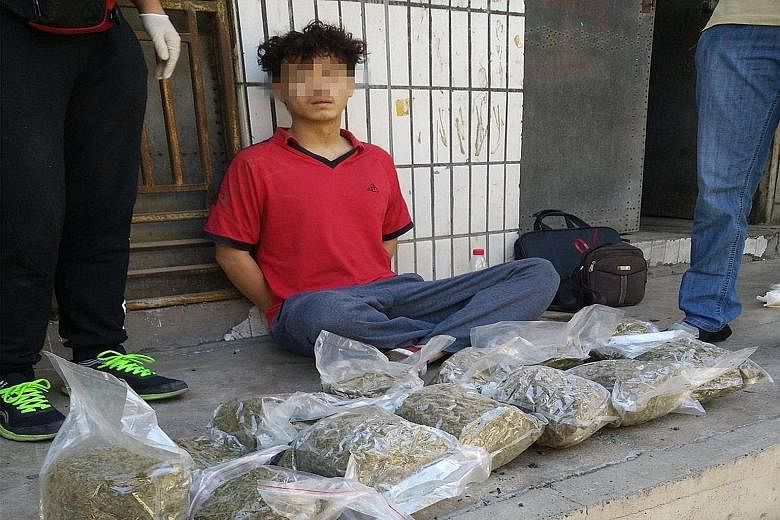China says social media has increasingly become a trading platform for drugs after police busted a ring run by a high school teacher accused of selling marijuana in at least 37 universities and schools, deepening concerns over the rise in the number of young drug users.
Police in coastal Wenzhou city this week revealed that the raids took place in several provinces in which the police arrested 23 suspects, including the teacher, and seized about 200kg of marijuana. This comes one month after police in Beijing detained 16 students over drug abuse at a school known as the cradle of China's rock music.
The relief mathematics teacher in Shandong, known only by his surname Sun, sold marijuana in 31 provinces and cities, including Hong Kong, via social media such as messaging apps WeChat and QQ, the Qianjiang Evening News reported on Wednesday.
Sun, 32, used code words to communicate with distributors and buyers. Drug users were called "pilots", sellers "captains", and words like "white snow" and "pineapple" referred to different grades of drugs, reported news website The Paper.
"If marijuana users leave the word 'pilot' when they apply to join the QQ groups, they'd be approved," an unnamed Wenzhou policeman was quoted as saying. He added that group members could view drug ads sent by Sun and place orders through private messages.
Sun had a dozen distributors, among whom the youngest was a middle-school girl aged 16. She was nabbed by police in June last year.
It is unclear how many students had bought drugs from Sun but the number of universities and schools involved is shocking, analysts said.
"Despite all the laws and punishment, more young people are using drugs and the Internet has increasingly become a trading platform," Mr Yue Shenshan, a Beijing-based lawyer, was quoted by Xinhua news agency as saying. "It means that drug abuse is not only an issue of criminal offence, but also a serious social problem."
Drug possession is punishable by fines or prison sentences. Drug traffickers face the death penalty depending on the amount involved.
In a survey conducted by the Twitter-like Weibo, about one in two of more than 11,000 voters put the blame on corrupted social values, and close to 30 per cent of them criticised schools and families for insufficient social education.
"This case indicates that some colleges and universities have given free rein to students," microblogger Qin Dading said in a post on Monday. "It's disappointing to see schools that are supposed to nurture talent turning into drug dens."
Police started to monitor Sun's activities on social media last May and learnt that he sent to buyers marijuana labelled as tea leaves or chocolate, via delivery services. His supplies came from Canada, as well as Shandong and Guangxi, and were priced as low as 10 yuan (S$2) per gram, but he sold them at five times higher. He had traded more than 800,000 yuan worth of drugs in the first half of last year, according to Shanghai Daily.
Sun, a graduate in agriculture studies, grew marijuana at a rented flat to "experiment and meet the increasing demand", police said.
Sun, a father of a three-year-old boy, stored and packaged the drug in the flat instead of his home to keep his family in the dark. He started to sell drugs from May last year.
His case is the latest in a series that has turned the spotlight on drug addicts in schools as police step up the crackdown on vice.
On Nov 24, police raided the Beijing Midi School of Music and arrested 16 students, aged 18 to 29, after they failed urine tests, provoking intense discussion in the print media and the Internet. They were released after a three-day detention.
Mr Zhang Fan, the school principal, said in early December that the students used drugs "out of curiosity", and that he decided to give them an opportunity to begin afresh.
"I won't expel the students," he said. "They're young and should be allowed to err. But we can definitely change them, move them and teach them."

